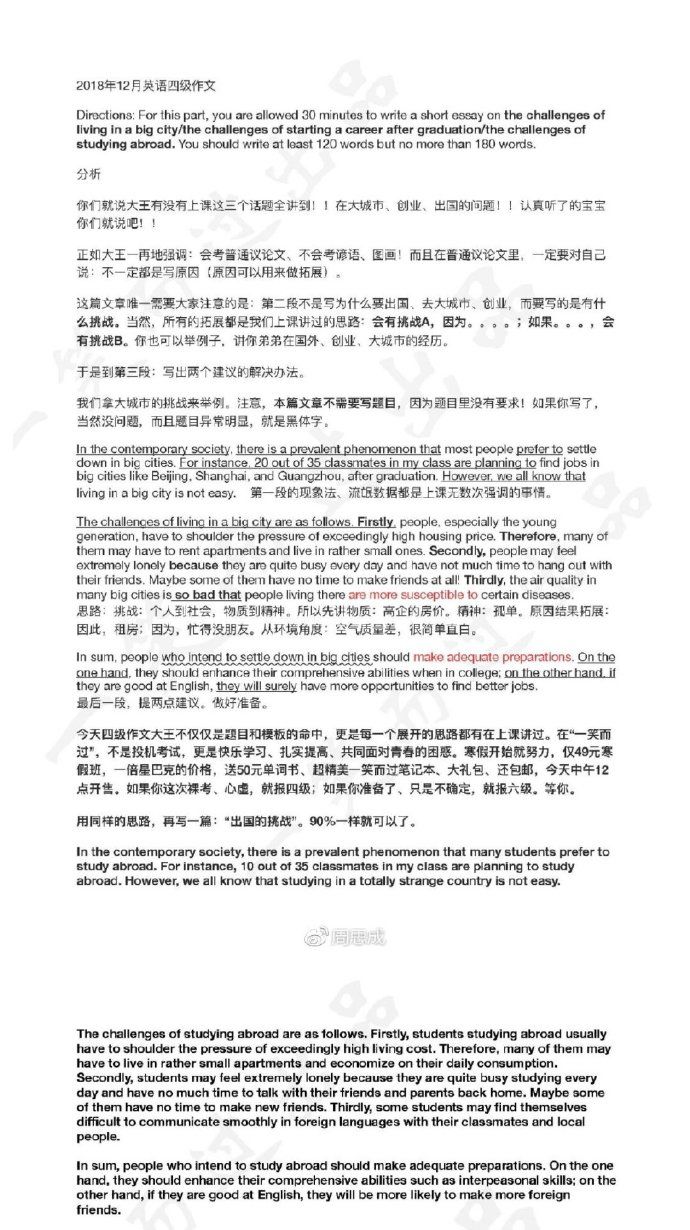自考“英语(一)”笔记 五十三
|
16.indifferent adj. 冷漠的,不关心的 indifference n. 冷漠 1)If parents are indifferent to their success, children will fail to make progress. (如果父母漠视孩子的成功,孩子就不会进步。) 2)He is absolutely indifferent to other people's miseries. (他对别人的痛苦漠不关心。) 3)He put on an air of indifference. (他摆出了一副满不在乎的神气。) 4)She was annoyed by her son's indifference to her. (她儿子对她的冷漠态度令她恼怒。) 17.discipline n. 纪律,训练;学科 v. 训练;使有纪律;惩罚 1)The discipline of hard work would do you a lot of good. (艰苦工作的磨练会对你大有好处。) 2)The young teacher couldn't keep discipline in her classroom. (那个年轻的教师无法维持课堂秩序。) 3)Scientists of many disciplines would work together to solve the problem. (许多学科的科学家们将一道来解决这个问题。) 4)They must learn to discipline themselves. (他们必须学会锻炼自己。) 5)He was disciplined for being late. (他因迟到而受罚。) 18.individual n. 个人,个体 adj. 个别的,单独的;独特的 1)The freedom of the individual was greatly emphasized in his talk. (他在讲话中十分强调个人的自由。) 2)Handwriting varies from individual to individual. (每个人的笔迹都不相同。) 3)Each individual leaf on the tree is different. (树上的每一片叶子都各不相同。) 4)There was nothing individual about him except a deep scar across his right cheek.(他除了右脸颊有条深疤外别无特征。) 本课简介 在人类共同生活的社会里有一些共认的社会准则,这些准则为大多数人所接受。如果你不能遵循这些准则,你则会被看作为一个缺少文明礼貌举止的人。善待他人,尊重他人能给我们带来一种优势,而这种优势会帮助我们成功。正因为如此,我们应该学会在看电影时保持安静;在点燃香烟前征得他人同意;注意选择接听移动电话的场合;与老师交谈时摘下随身听的耳机;满口含着食物时不随意开口讲话;该尊称他人时不随性而为乱称呼……。这些看似不重要的小节恰恰是最能反映一个人的社会公德的。 本课主要语言点 1. Unless you want to end a relationship, you don't tell another person what you think of her or him like this. unless在本句中的意思是“if not” (除非,如果不),如: 1)You will fail the exam unless you study harder. (你若不更加努力学习,考试会不及格。) 2)We will go on with the experiment unless something unforeseen happens. (如果不发生意外,我们将继续试验。) 3)I will not go to the party unless he invites me. (如果他不邀请我,我就不去参加聚会。) 4)Nothing, unless a miracle, can save him. (除非出现奇迹,他无法得救。) end在本句中用作动词,意思是“结束”。如: 1)The meeting did not end until midnight. (会议开到半夜才结束。) 2)The anti-Japanese War ended in 1945. (抗日战争于1945年结束。) 3)He refused to end his four-week tour in such a manner. (他不愿以这种方式结束为期四周的旅行。) 2. Failing to be impressed by a friend's collection of stamps, yawning when a golfer tells you about what great shot he made… are all things that educated people try not to do. 本句中三个并列的动名词短语做主语,整个句子是一个“主语+系动词+表语”的句型。如: 1)Smoking is not good for your health. (吸烟有害你的健康。) 2)Making experiment is one way of learning. (实验是学习的一条途径。) be impressed by 意思是“给…深刻印象”。如: 1)I was impressed by his talent. (他的才干给我留下了深刻的印象。) 2)He was impressed by the gorgeous sunset. (绚丽的夕阳给他留下了深刻的印象。) golfer意思为“高尔夫球运动员”,这个词是由golf加后缀-er构成的,英语中这一类词很多。如:baker (面包师傅),gardener (园丁),miller (磨坊主),singer (歌唱家),user (使用者。) 1)He tried not to let out the secret. (他试图不泄露秘密。) 2)We tried not to be misled by them. (我们努力不被他们误导。) 3. There are no laws enforcing respect. 本句是一个There be + noun + V-ing 结构,表示存在(有),there失去表示场所的意义。如: 1)There was a fire burning in the fireplace. (壁炉里火在燃烧。) 2)There were two bulldozers knocking the place flat. (两台推土机把那儿夷平。) 句中的enforce是一个及物动词,意思是“实施;强制”。如: 1)It is necessary to enforce discipline in the army. (在部队里执行纪律是必要的。) 2)He strongly objected to enforcing obedience on children. (他强烈反对强迫儿童服从。) 4. These guidelines represent what a majority of people consider acceptable and what they consider unacceptable. represent在本句中做及物动词用,意思是“代表;体现”。如: 1)The blue lines on the map represent rivers. (地图上的蓝线代表河流。) 2)These views don't represent the real thinking of the local residents. (那些观点并不反映当地居民的真实思想。) 句中what引导的是宾语从句,如: 1)I will always remember what my mother said to me before I went to college.(我将永远记住我上大学前妈妈对我说的话。) 2)I didn't see what they were doing there. (我没看见他们在那儿干什么。) 3)His idea couldn't represent what the ordinary people really liked.(他的想法不能代表普通百姓真正所喜欢的东西。) consider是一个常用动词,通常有以下几种用法: 1)consider + 宾语 He had no time to consider the matter. (他没有时间考虑这件事。) 2)consider + 宾语 + 宾语补足语 Some people considered the attack a mistake. (有人认为那次进攻是个错误。) 3)consider + that 从句 We consider that the young man is not guilty. (我们认为那个年轻人无罪。) 4)consider + V. + ing He considered changing his job. (他考虑换一份工作。) 5)consider to be/as They consider themselves to be very lucky. (他们认为自己很幸运。) He is considered to be an authority. (他被认为是权威。) They considered the house as beautiful. (他们认为那房子很美。) 在上面的三个例句中,to be和as都可以被省略,因此三例句可以改写为: They consider themselves lucky. He is considered an authority. They consider the house beautiful. 5. They are not even aware that this habit will bother the other members of the audience. aware这个形容词很常用,需好好掌握,在第十二单元中我们已经接触过这个词,在此再巩固一下。 1)be aware of If you were aware of all that, you would change your mind. (如果你知道了那一切,你会改变主意的。) 2)be aware that He was aware that he had drunk too much. (他知道他喝的太多了。) bother在本句中做动词用,意思是“打扰”。在bother后用不定式则表示“费心去做某事”。如: 1)Don't bother me, I have to finish the work in an hour. (别打扰我,我得在一小时内做完这个工作。) 2)Don't bother to talk to him. He has no interest in anything. (别费心跟他讲话,他对什么都没兴趣。) audience (观众,听众)当一个整体看待,用做单数;当各成员看待,用做复数。如: 1)The audience was (were) enjoying the performance. (观众在欣赏演出。) 2)That book has a large audience. (那本书有广大的读者。) |








